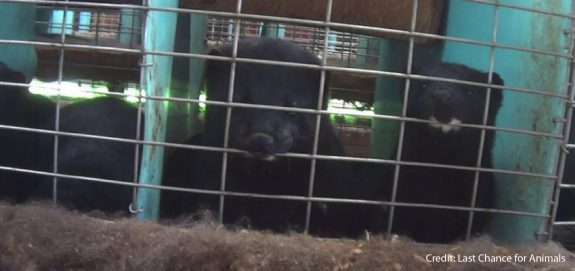Millbank Fur Farm, a mink factory fur farm near Guelph, Ontario, has been convicted and fined for violating Ontario’s animal protection laws. The fur farm pleaded guilty in March, 2021 to failing to comply with standards of animal care, and has been ordered to pay a monetary penalty.
Millbank Fur Farm was charged with animal cruelty offences in 2018, following the release of secretly-recorded footage obtained by a Last Chance for Animals undercover whistleblower working at the fur farm, which confines and kills 40,000 minks per year. The hidden-camera footage, gathered over the course of a year, provided Canadians with the first in-depth look at the inner workings of a fur farm in Canada. What it revealed was deeply disturbing. Videos and photographs from Millbank Fur Farm showed filthy conditions, minks being confined in tiny cages, and minks suffering from untreated and festering wounds. Animals regularly exhibited repetitive behaviours associated with poor psychological health, such as pacing back and forth, and rapidly circling in their cages.
While shocking, the cruelty exposed at Millbank Fur Farm is standard on modern fur farms in Canada. Fur farms across the country confine thousands of animals in tiny cages in appalling conditions, preventing minks from performing natural behaviours such as swimming in water, exploring, and foraging. Animal Justice advocates for the closure of all fur farms in Canada because fur farming is unjustifiably abusive and causes vast amounts of animal suffering.
The animal cruelty conviction against Millbank Fur Farm is an important reminder of the valuable role that whistleblowers play in holding the farmed animal industry accountable. Fur farms in Ontario and many other provinces are not licensed or monitored by authorities, so hidden-camera video is generally the only glimpse the public has into the suffering that animals endure in tiny wire cages on fur farms. Fur industry groups falsely depict mink farms as clean and bucolic facilities that are committed to the humane treatment of animals, and without undercover footage, the Canadian public would be unable to learn the truth about what happens behind the closed doors of the cruel fur farming industry.
Unfortunately, undercover exposés like this one are now illegal in Ontario and other provinces, due to new ag gag laws that make it illegal for animal advocates or journalists to go undercover on farms to expose animal cruelty. Animal Justice is currently challenging Ontario’s ag gag law in court on the basis that it unconstitutionally restricts freedom of expression and covers up abuse and neglect on fur farms and other factory farms.
Join the Animal Justice mailing list




